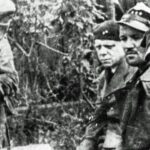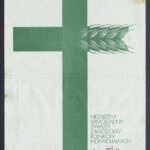Westerplatte dramas through the eyes of Józef Łopatniuk
We invite you to the story of Ernest Szum about the defense of Westerplatte in September 1939, seen through the eyes of the platoon platoon Józef Łopatniuk, from Glinny Stok in the commune of Siemień, the commander of the anti-tank gun platoon of the Military Transit Depot. In the background of the story, two most controversial issues concerning the described events unfold: the conflict of the command elite, affecting the attitudes and behavior of soldiers, and the attempted surrender on the second day of defense.
The Führer and the Jewish doctor Bloch
What was the relationship between Dr. Eduard Bloch and the founder of the ephemeral “Aryan” empire? How did this humble provincial Jewish doctor gain the recognition and even gratitude of Adolf Hitler? Should the sources of the German leader’s anti-Semitism be sought in the tragic circumstances associated with this acquaintance?
Wojciech Paszyński tries to find answers to these questions in his article entitled “Edeljude” and the miraculous salvation — the case of a close relationship between Adolf Hitler and the Jewish doctor Eduard Bloch (1872–1945).
Farmers and the Church
The pastoral ministry of farmers was one of the pastoral forms of the Church, clearly formative. This aspect cannot be overlooked when recreating the past from those years. For farmers associated with Solidarity, it was a space of support, allowing them to go through the most difficult period. Without this form of activity, Solidarity in the countryside practically had no chance of surviving – notes Eugeniusz Wilkowski in the article Pastoral care of farmers in the Lublin diocese in the 1980s. We invite you to read the latest text in our pages.
Evaluation results in the Index Copernicus database
We are pleased to announce that “The Humanities Yearbook of Radzyn Podlaski” has positively passed the evaluation process and is indexed in the ICI Journals Master List database for 2019.
The Index Copernicus Value (ICV) for 2019 was set at ICV 2019 = 70.90.
How Biała Podlaska became the capital of the voivodeship
Neither the new province of Bialskopodlaskie, let alone Biała Podlaska, were adequately prepared to perform their function, argues Małgorzata Nikoniuk in a newly published article in our pages. With the delegation of powers, the organizational chaos grew more and more, as the authorities were unable to adjust to the new two-tier division of the administration. We invite you to read.
What do the letters to the Party show?
The communist party, exercising the dictatorial power in Poland, was at the same time the final and highest appeal body to which people turned to with their problems in their professional and private life. The new article in our pages shows through the prism of letters and complaints to the PZPR the social mood of the inhabitants of the newly created Biała Podlaskie Voivodeship. The presented problems seem characteristic of the Polish People’s Republic.
Paweł Orłowski: Everyday obstacles approached by the inhabitants of the Biała Podlaska Voivodeship in the first years after its establishment (1975-1976) reflected in letters and complaints addressed to the PZPR’s Voi-vodeship Committee in Biała Podlaska Continue reading
Medieval fortress in Zavada near Tarnov
In the early Middle Ages in Zawada near Tarnów there was a huge defensive structure with a central fortification and fortified boroughs. The stronghold served as a military function, enabling the protection of the surrounding population against the attacks of nomads from the east and Slavic teams from the south and southwest. Everyday life went on inside. In a new article in our pages, Tomasz Sajecki presents the archeological analysis of the settlement in the text: Zawada near Tarnów – a large settlement from the early Middle Ages. Continue reading
What did the policeman think?
This is not a bold thesis put forward contrary to known jokes about militiamen, but a contribution to the history of formation of the Citizens’ Militia cadre – communist formation of public order and security – in the Radzyń Podlaski poviat. Dariusz Magier decided to analyze the attitude of militia officers in the Radzyń poviat to the two main elements responsible for post-war changes in Poland: the communist system and the Soviet Union. The source of considerations are the characteristics of the militia staff prepared by the poviat secretary of the Polish Workers’ Party in Radzyń Podlaski in early 1946.
Go to article: The attitude of militia force from Radzyń Podlaski poviat towards communism and the Soviet Union in early 1946
“Solidarity” of farmers after December 13, 1981
The construction and functioning of the underground structures of agricultural “Solidarity” in the Lubelskie Voivodship is a problem that has been investigated to a far extent insufficient. Therefore, we are pleased to invite you to read the digital version of the new in our article dr. Eugeniusz Wilkowski, a witness to the events and the main researcher of the history of “Solidarity” in the Lublin region, who discusses the sources, the state of research and mechanisms of the emergence and development by the communist Security Service of the underground structures of farmers: Underground structures of the “Solidarity” farmers’ union in the Lublin region (Poland) in 1982–1989
We are in a new indexing database
We are pleased to announce that the “Humanities Yearbook of Radzyń Podlaski” has successfully passed the application process to the prestigious Directory of Open Access Journals indexing database. Continue reading










